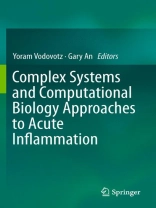The difficulty in achieving effective translation of basic mechanistic biomedical knowledge into effective therapeutics, is the greatest challenge in biomedical research. Nowhere is this more apparent than in the reductionist approaches to understanding and manipulating the acute inflammatory response in the settings of sepsis, trauma/hemorrhage, wound healing, and related processes. This book discusses complex systems and computational biology methods and approaches that have advanced sufficiently to allow for knowledge generation, knowledge integration, and clinical translation in the settings of complex diseases related to the inflammatory response. Well-regulated, self-resolving inflammation is necessary for the appropriate communication and resolution of infection and trauma, and for maintenance of proper physiology and homeostasis. In contrast, self-sustaining inflammation drives the pathobiology of the aforementioned diseases. It is now increasingly recognized that controlling and reprogramming inflammation in order to reap the benefits of this evolutionarily-conserved process is preferred to simply abolishing indiscriminately.
สารบัญ
An overview of the Translational Dilemma and the need for Translational Systems Biology of inflammation.- Part I: Complex Systems Methods and Applications.- Translational Equation-based Modeling.- Agent-based Modeling in Translational Systems Biology.- Analysis of Heart Rate Variability.- Analysis of Ventilatory Pattern Variability.- Part II: Translational Modeling of Sepsis and Trauma.- Disorder of Systemic Inflammation in Sepsis and Trauma: A Systems Perspective.- Multi-scale equation-based models: Insights for Inflammation and Physiological Variability.- Integrating Data Driven and Mechanistic Models of the Inflammatory Response in Sepsis and Trauma.- In silico Trials and Personalized Therapy for Sepsis and Trauma.- Part III: Translational Modeling of Wound Healing.- Disorder of Localized Inflammation in Wound Healing: A Systems Perspective.- Equation-based Models of Wound Healing and Collective Cell Migration.- Agent-based Models of Wound Healing.- Part IV: Translational Modeling of Host-pathogen Interactions.- Modeling Host-Pathogen Interactions in Necrotizing Enterocolitis.- Modeling Host-Vector-Pathogen Immuno-inflammatory Interactions in Malaria.- Part V: Future Perspectives.- Translation to Implementation.- The Rationale and Implementation of Translational Systems Biology as a new Paradigm for the Study of Inflammation.- Index.












